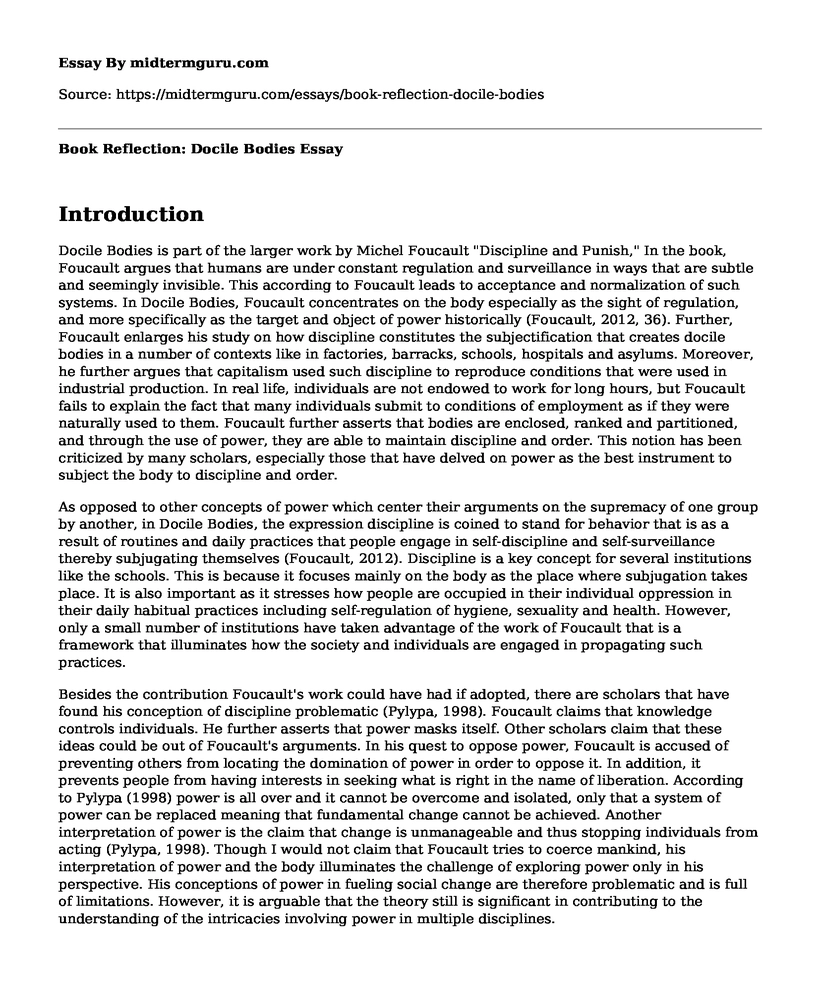Introduction
Docile Bodies is part of the larger work by Michel Foucault "Discipline and Punish," In the book, Foucault argues that humans are under constant regulation and surveillance in ways that are subtle and seemingly invisible. This according to Foucault leads to acceptance and normalization of such systems. In Docile Bodies, Foucault concentrates on the body especially as the sight of regulation, and more specifically as the target and object of power historically (Foucault, 2012, 36). Further, Foucault enlarges his study on how discipline constitutes the subjectification that creates docile bodies in a number of contexts like in factories, barracks, schools, hospitals and asylums. Moreover, he further argues that capitalism used such discipline to reproduce conditions that were used in industrial production. In real life, individuals are not endowed to work for long hours, but Foucault fails to explain the fact that many individuals submit to conditions of employment as if they were naturally used to them. Foucault further asserts that bodies are enclosed, ranked and partitioned, and through the use of power, they are able to maintain discipline and order. This notion has been criticized by many scholars, especially those that have delved on power as the best instrument to subject the body to discipline and order.
As opposed to other concepts of power which center their arguments on the supremacy of one group by another, in Docile Bodies, the expression discipline is coined to stand for behavior that is as a result of routines and daily practices that people engage in self-discipline and self-surveillance thereby subjugating themselves (Foucault, 2012). Discipline is a key concept for several institutions like the schools. This is because it focuses mainly on the body as the place where subjugation takes place. It is also important as it stresses how people are occupied in their individual oppression in their daily habitual practices including self-regulation of hygiene, sexuality and health. However, only a small number of institutions have taken advantage of the work of Foucault that is a framework that illuminates how the society and individuals are engaged in propagating such practices.
Besides the contribution Foucault's work could have had if adopted, there are scholars that have found his conception of discipline problematic (Pylypa, 1998). Foucault claims that knowledge controls individuals. He further asserts that power masks itself. Other scholars claim that these ideas could be out of Foucault's arguments. In his quest to oppose power, Foucault is accused of preventing others from locating the domination of power in order to oppose it. In addition, it prevents people from having interests in seeking what is right in the name of liberation. According to Pylypa (1998) power is all over and it cannot be overcome and isolated, only that a system of power can be replaced meaning that fundamental change cannot be achieved. Another interpretation of power is the claim that change is unmanageable and thus stopping individuals from acting (Pylypa, 1998). Though I would not claim that Foucault tries to coerce mankind, his interpretation of power and the body illuminates the challenge of exploring power only in his perspective. His conceptions of power in fueling social change are therefore problematic and is full of limitations. However, it is arguable that the theory still is significant in contributing to the understanding of the intricacies involving power in multiple disciplines.
References
Foucault, M. (2012). Discipline and Punish: The birth of the prison. Vintage.
Pylypa, J. (1998). Power and bodily practice: applying the work of Foucault to an anthropology of the body. Arizona Anthropologist.
Cite this page
Book Reflection: Docile Bodies. (2022, Sep 28). Retrieved from https://midtermguru.com/essays/book-reflection-docile-bodies
If you are the original author of this essay and no longer wish to have it published on the midtermguru.com website, please click below to request its removal:
- Theme of Disillusionment in the Invisible Man by Ralph Ellison
- Where Are You Going, Where Have You Been? by Joyce Carol Oates - Essay Sample
- Essay on Where Are You Going, Where Have You Been? by Joyce Carol Oates
- Book Analysis: Lunch Money by Andrew Clements - Paper Example
- Essay on Hemingways Soldiers Home and Big Two-Heated River
- Literary Analysis of Kate Chopin's "The Story of An Hour"
- Character Analysis Essay on Macbeth







